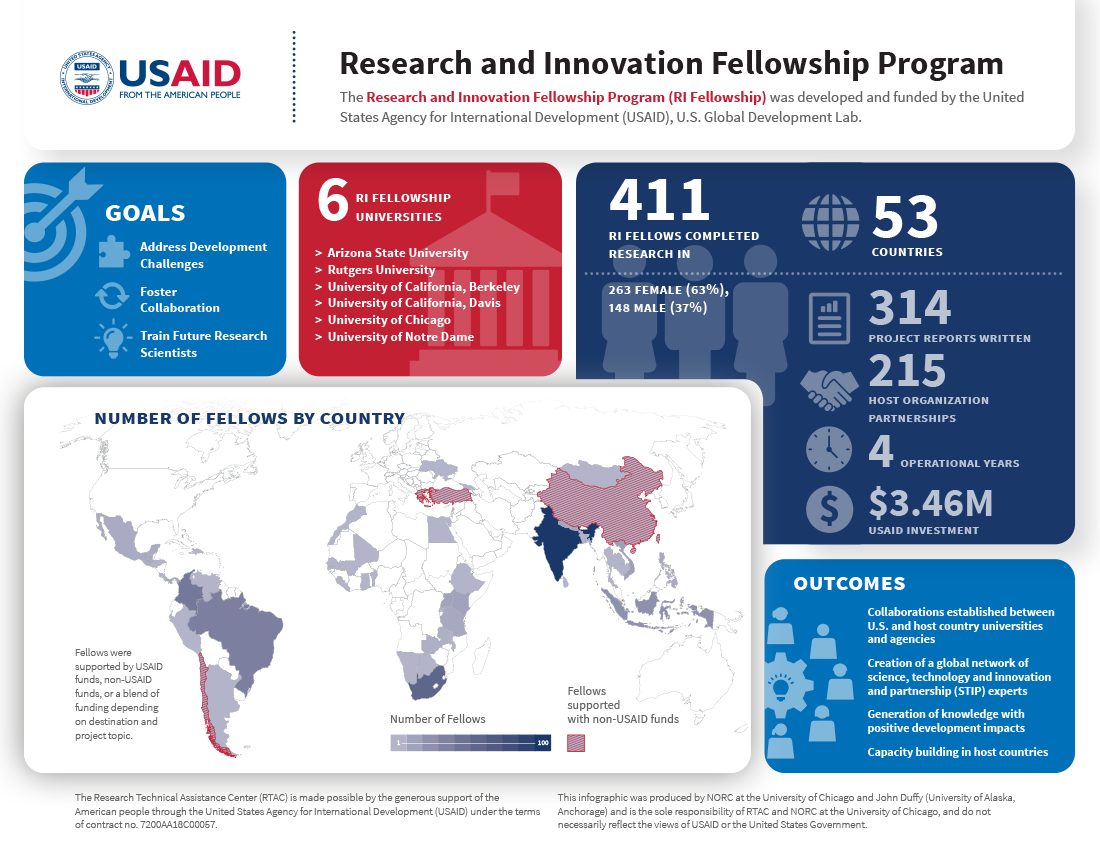- What We Do
- Agriculture and Food Security
- Democracy, Human Rights and Governance
- Economic Growth and Trade
- Education
- Environment and Global Climate Change
- Gender Equality and Women's Empowerment
- Global Health
- Humanitarian Assistance
- Transformation at USAID
- Water and Sanitation
- Working in Crises and Conflict
- U.S. Global Development Lab
Speeches Shim
The Research and Innovation Fellowship Program (RI Fellowship) was developed and funded by the United States Agency for International Development (USAID), U.S. Global Development Lab.
Goals
Address Development Challenges
Foster Collaboration
Train Future Research Scientists
6 RI Fellowship Universities
- Arizona State University
- Rutgers University
- University of California, Berkeley
- University of California, Davis
- University of Chicago
- University of Notre Dame
411 RI Fellows completed research in:
- 53 countries
- 215 host organization partnerships
- 4 operational years
- $3.46M usaid investment
- 314 project reports written
- 263 female (63%), 148 male (37%)
Number of Fellows by Country
Fellows were supported by USAID funds, non-USAID funds, or a blend of funding depending on destination and project topic.
* Fellows supported with non-USAID funds
- Argentina* (1)
- Dominican Republic (1)
- Honduras (3)
- Burma (1)
- South Africa (62)
- Bangladesh (3)
- Ecuador (1)
- India (102)
- Namibia (1)
- Sri Lanka (1)
- Benin (2)
- Egypt (1)
- Indonesia (6)
- Nepal (8)
- Taiwan* (1)
- Brazil (42)
- El Salvador (2)
- Lebanon (1)
- Panama (8)
- Tanzania (3)
- Bahamas (1)
- Ethiopia (2)
- Liberia (2)
- Peru (1)
- Thailand (7)
- Botswana (1)
- Gambia (1)
- Kenya (12)
- Philippines (8)
- Turkey* (2)
- Cambodia (3)
- Georgia (1)
- Malawi (2)
- Rwanda (1)
- Uganda (9)
- Chile (8)
- Ghana (2)
- Mali (1)
- Senegal (2)
- Ukraine (1)
- China* (2)
- Greece* (2)
- Mexico (5)
- Sierra Leone (1)
- Venezuela (1)
- Colombia (45)
- Guatemala (5)
- Mongolia (1)
- Singapore* (1)
- Vietnam (16)
- Costa Rica (1)
- Haiti (2)
- Morocco (1)
- Zambia (4)
The Research Technical Assistance Center (RTAC) is made possible by the generous support of the American people through the United States Agency for International Development (USAID) under the terms of contract no. 7200AA18C00057.
This infographic was produced by NORC at the University of Chicago and John Duffy (University of Alaska, Anchorage) and is the sole responsibility of RTAC and NORC at the University of Chicago, and do not necessarily reflect the views of USAID or the United States Government.


Comment
Make a general inquiry or suggest an improvement.